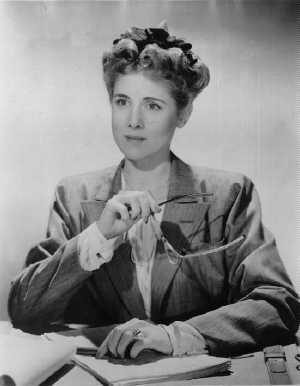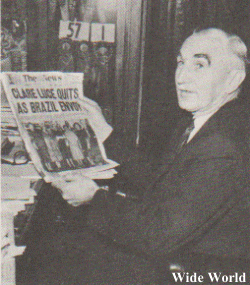 SKC Films Library SKC Films Library |
| |
| SKC Films Library
>> American History
>> United
States: General History and Description >> Early 20th Century, 1901-1960 >> Individual Biography, A-Z |
 Clare
Boothe Luce Clare
Boothe Luceplaywright, journalist, U.S. Congresswoman, the first American woman to hold a major diplomatic post Early Life Clare Boothe was born in New York City on April 10, 1903, the daughter of a businessman and a dancer. She was educated at St. Mary's School in Garden City, New York, and Miss Mason's School in Tarrytown, graduating from the latter in 1919. She spent her childhood in Chicago and Memphis, and then, after her parents separated, with her mother in France. As a child Clare wanted to become an actress, and she briefly attended Clare Tree Major's School of Theatre in New York City before losing interest and dropping out. She subsequently spent some time touring Europe with her mother. In Europe, Clare met Mrs. O.H.P. Belmont, a New York society matron and advocate of women's suffrage, who sparked her interest in women's rights. Belmont also introduced her to George Tuttle Brokaw, a New York clothing manufacturer who was 24 years her senior. The two were married on August 10, 1923, and had one daughter before divorcing in 1929. Editor and Playwright Boothe became an editorial assistant at Vogue magazine in 1930, associate editor of Vanity Fair in 1931, and managing edtor of Vanity Fair in 1933. She also began writing short sketches satirizing New York society figures, which were subsequently compiled and published under the title Stuffed Shirts in 1933. She resigned from Vanity Fair in 1934. On November 23, 1935, Boothe married Henry Robinson Luce, founder of Time, Fortune, Life and Sports Illustrated magazines. Luce next turned her energy towards writing plays. Abide With Me, a psychological drama about an abusive husband on a collision course with his terrified wife, was panned by critics upon its release in 1935. Her second play, The Women, a satire on the idleness of wealthy wives and divorcees, was coolly received by critics in 1936, but became very popular with the public. It toured throughout the United States and eighteen countries, and was even adapted to the silver screen. Her other notable plays include: Kiss the Boys Good-Bye (1938), a comedy about Hollywood's highly publicized search for an actress to portray Scarlett O'Hara which was named one of the ten best plays of the year; and Margin for Error (1939), which treated the murder of a Nazi agent as both comedy and melodrama, also proved quite popular with the public. Journalist In 1940, Luce traveled to Europe as a journalist for her husband's Life magazine. From there she published first-hand observations of the German offensives in Italy, France, Belgium, the Netherlands, and England. These articles were subsequently collected and published under the title Europe in the Spring (1940). In 1941, Clare and her husband toured China and reported to Life the status of the country, particularly its war with Japan. After U.S. entry into World War II, Clare toured Africa, India, China and Burma for Life, during which time she interviewed General Harold R.L.G. Alexander, commander of British troops in Middle East, Jawaharlal Nehru, Chiang Kai-Shek, and General "Vinegar Joe" Stilwell, commander of American troops in the China-Burma-India theater. Congresswoman In 1942, using her travels as evidence of experience in international affairs, Luce ran for a seat in the U.S. House of Representatives as a Republican from Connecticut. Campaigning on a platform that alleged that President Franklin D. Roosevelt had brought the U.S. into war unprepared, Boothe won the election with ease. In her maiden speech she called Vice-President Henry A. Wallace's freedom-of-the-air policy to insure international peace "globaloney." A member of the powerful Military Affairs Committee, Congresswoman Luce spoke often on behalf of American troops fighting overseas, as well as on issues concerning their eventual return to civilian life. After visiting American troops in Italy on Christmas Day 1944, she advocated immediate aid to Italian war victims. After being re-elected in 1944, she warned against the growing threat of Communism internationally, especially in China, and of the seeming soft approach to Communism being taken by Roosevelt. She was also instrumental in creation of the Atomic Energy Commission. Ironically, despite her frequent criticism of President Roosevelt's foreign policy, she voted in his favor on other issues most of the time. On January 11, 1944, Luce's only daughter Ann was killed in an automobile accident, which caused her to suffer a nervous breakdown and undergo psychotherapy. The experience led her to join the Catholic Church in 1946, after which she chose to leave the House and return to writing. After leaving Congress in 1947, Luce wrote a series of articles describing her conversion to Catholicism, which were subsequently published in McCall's; wrote the screenplay for Come to the Stable (1949), for which she received an Academy Award nomination; wrote the play Child of the Morning (1951); and edited Saints for Now (1952), a compilation of essays about various saints. Ambassador Although she had given up her seat in Congress, Luce had not given up politics. In 1952 she campaigned on behalf of Republican presidential candidate Dwight D. Eisenhower. In appreciation of her campaign work, President Eisenhower named her Ambassador to Italy in 1953, making her the first American woman to hold a major diplomatic post. Her most important contribution in this post was helping to settle a dispute between Italy and Yugoslavia over the city of Trieste, in October 1954. She was forced to resign her position in 1956 due to arsenic poisoning brought on by paint chips in her bedroom ceiling.
right: Senator Morse reads a headline stating that Luce had quit as envoy to Brazil Later Life Luce remained active within the ultraconservative wing of the Republican Party for several more years. She supported Barry Goldwater's bid for the presidency in 1964. That same year she announced her candidacy for the U.S. Senate on the Conservative Party ticket, but withdrew from the race when Republican party leaders voiced their disapproval. Harry Luce retired as editor-in-chief of Time in 1964, and Clare soon joined him by retiring from public life herself. The couple lived in Phoenix, Arizona, until his death from a sudden heart attack on February 28, 1967, after which she had a house built in Honolulu, Hawaii. Clare Luce stayed out of the limelight until 1970, when she released the play Slam the Door Softly, which attracted little attention. In 1981, after President Ronald Reagan appointed her to the President's Foreign Intelligence Advisory Board, Luce moved to an apartment in the Watergate complex in Washington, D.C. She served on the board until 1983, when she was presented with the Presidential Medal of Freedom. Clare Boothe Luce died in her Washington, D.C., apartment of a brain tumor on October 9, 1987. WEB SOURCE SEE ALSO |
SKC Films Library >> American History >> United States: General History and Description >> Early 20th Century, 1901-1960 >> Individual Biography, A-Z This page was last updated on April 09, 2017. |
